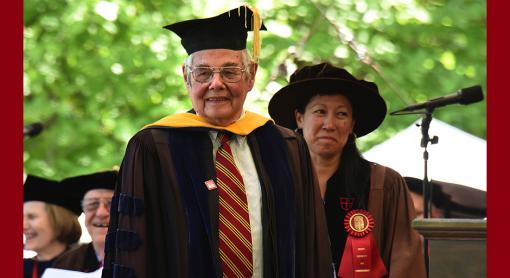
Barrett Hazeltine, escorted by Theresia Gouw of the Board of Fellows, accepts the Susan Colver Rosenberger Medal of Honor.
Credit: Frank Mullin/Brown University
At the 2015 Commencement ceremony on the College Green, the faculty of Brown University conferred its highest honor, the Susan Colver Rosenberger Medal of Honor, on Barrett Hazeltine, professor emeritus of engineering.
Barrett Hazeltine, professor emeritus of engineering, who has inspired and guided scores of young entrepreneurs, was awarded the Susan Colver Rosenberger Medal of Honor at Brown University's 247th Commencement ceremony.
The medal, which has been awarded 30 times since its establishment in 1919, is the highest honor bestowed by the Brown faculty.
Hazeltine, who joined the Brown faculty in 1959, is best known for his classes in management and entrepreneurship that have helped to launch countless careers in business and nonprofit leadership. "Engineering 9: Management of Industrial and Nonprofit Organizations," which Hazeltine has taught for more than 40 years, remains one of the most popular courses at the University. Last fall more than 500 students — nearly a tenth of Brown's total undergraduate student body — were enrolled in the class.
"Barrett has impacted generations of Brown students," said Lawrence Larson, dean of Brown's School of Engineering. "His energy is boundless and his ability to connect with students in a personal way is inspiring. His unwavering support and guidance for countless students and budding entrepreneurs has helped them launch scores of companies."
Hazeltine joins previous Rosenberger recipients including Brown physicist and Nobel Laureate Leon Cooper, former Brown President Ruth Simmons, former IBM CEO and former ambassador to the Soviet Union Thomas J. Watson, and former U.S. Senator Claiborne Pell.
Engin9: Launchpad for entrepreneurs
When Hazeltine joined the Brown faculty, having received bachelors and masters degrees in engineering from Princeton and a Ph.D. from the University of Michigan, he taught classes mainly in electronics and telecommunications. But in the late 1960s, he began developing the classes that would make him the stuff of legend at Brown and beyond.
The Ford Foundation, concerned that university engineering departments were populated with too many people who had not done any industrial or commercial engineering, started a program called Faculty Residencies in Engineering Practice. As one of the program's first members, Hazeltine worked with the research and development manager for the aerospace firm Raytheon. "We talked about what the Division should be doing to keep up to date," Hazeltine recalled. "I came back thinking that research management was an interesting topic."
Then in 1972, Hazeltine received one of Brown's inaugural Wriston Fellowships, which are awarded to young faculty to help spark innovation in teaching. Hazeltine used his award to spend time at the Harvard Business School, boning up on knowledge of business, management and economics.
Shortly thereafter, ENGIN9 was born. It started as a Group Independent Study Project (GISP) with just a few students, but after two years was added as a regular course. "It seemed like it might have some legs," Hazeltine said of the class in an understatement typical of his modesty.
By the 1980s, ENGIN9 was one of the most popular classes on campus and it remains so today. The class is built on business case studies, many based on the work of Brown graduates, chronicling the successes, failures, challenges, and solutions of real-world companies. Hazeltine says he thinks students appreciate the course's practical approach. "I think it's important to use examples that are real life," he said. "Obscure models of the way society or economics works doesn't always appeal to 20-year-olds."
Many who have taken the class have gone on to form their own companies. The beverage company Nantucket Nectars, software firms Clearview and Andera, and The Steel Yard, a Providence artists community, are just a few of the ventures that have roots in Hazeltine's guidance and mentorship. The leaders of many of these companies return to Brown to share their expertise with ENGIN9 students.
Hazeltine has long been a favorite of the Brown student body. He won the senior class award for teaching 13 straight years until the decision was made in 1985 to simply name the award after him. Connecting with the students, Hazeltine says, is the most important part of his work as a professor.
"Brown will prosper to the extent that it serves undergraduates at a vulnerable time in their lives," he said. "I think every student needs to have the experience of having their names known and knowing that someone is interested in them as a person."
And it's the connection with students that has kept Hazeltine in the classroom even after his official retirement in 1997.
"The fact is that Brown students are really fun to work with," he said. "It's something new every day. Wait, that's not true; it's something new every hour.
By Kevin Stacey